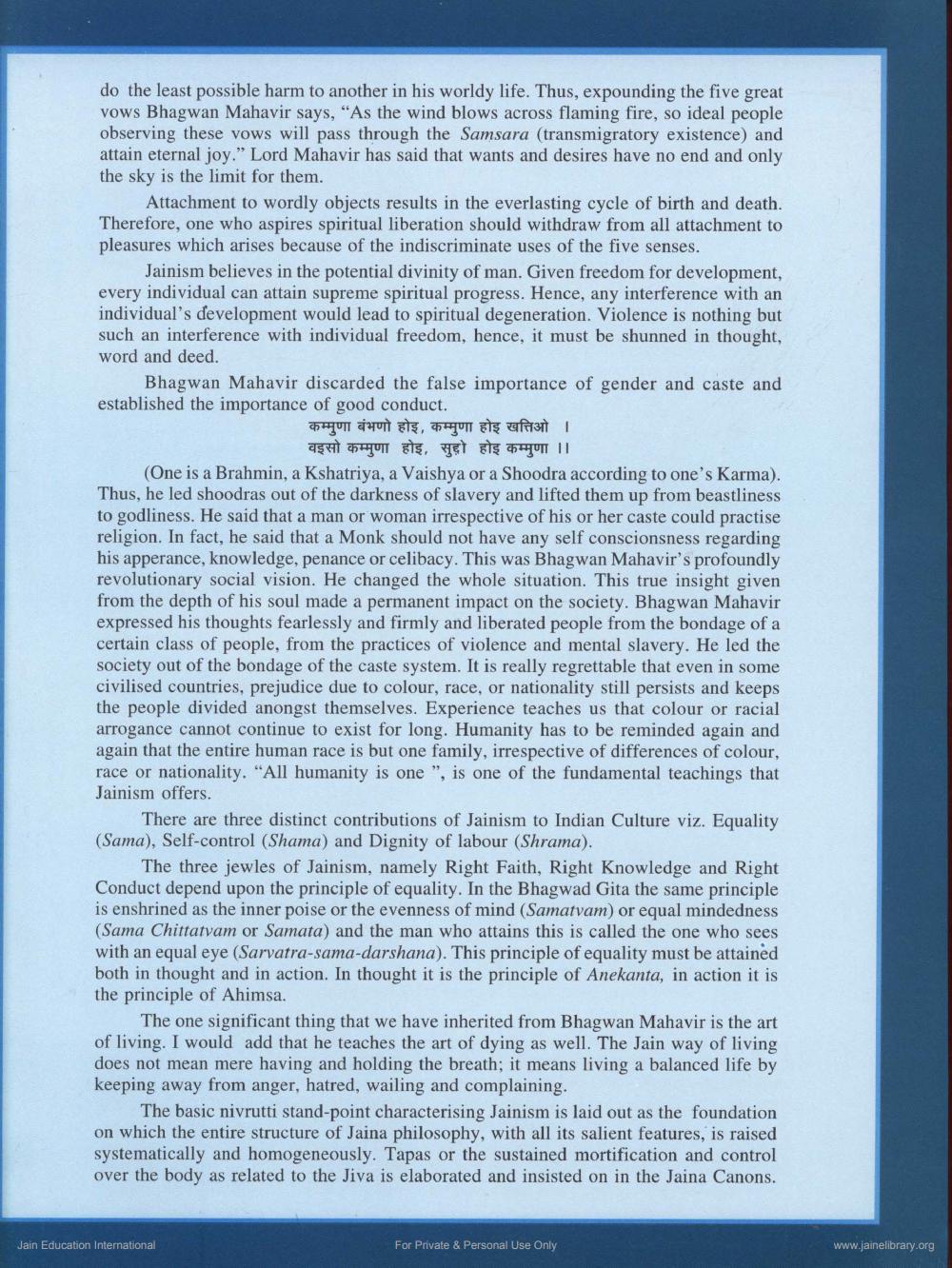________________
do the least possible harm to another in his worldy life. Thus, expounding the five great vows Bhagwan Mahavir says, “As the wind blows across flaming fire, so ideal people observing these vows will pass through the Samsara (transmigratory existence) and attain eternal joy." Lord Mahavir has said that wants and desires have no end and only the sky is the limit for them.
Attachment to wordly objects results in the everlasting cycle of birth and death. Therefore, one who aspires spiritual liberation should withdraw from all attachment to pleasures which arises because of the indiscriminate uses of the five senses.
Jainism believes in the potential divinity of man. Given freedom for development, every individual can attain supreme spiritual progress. Hence, any interference with an individual's development would lead to spiritual degeneration. Violence is nothing but such an interference with individual freedom, hence, it must be shunned in thought, word and deed.
Bhagwan Mahavir discarded the false importance of gender and caste and established the importance of good conduct.
कम्मुणा बंभणो होइ, कम्मुणा होइ खत्तिओ ।
वइसो कम्मुणा होइ, सुट्टो होइ कम्मुणा ।। (One is a Brahmin, a Kshatriya, a Vaishya or a Shoodra according to one's Karma). Thus, he led shoodras out of the darkness of slavery and lifted them up from beastliness to godliness. He said that a man or woman irrespective of his or her caste could practise religion. In fact, he said that a Monk should not have any self conscionsness regarding his apperance, knowledge, penance or celibacy. This was Bhagwan Mahavir's profoundly revolutionary social vision. He changed the whole situation. This true insight given from the depth of his soul made a permanent impact on the society. Bhagwan Mahavir expressed his thoughts fearlessly and firmly and liberated people from the bondage of a certain class of people, from the practices of violence and mental slavery. He led the society out of the bondage of the caste system. It is really regrettable that even in some civilised countries, prejudice due to colour, race, or nationality still persists and keeps the people divided anongst themselves. Experience teaches us that colour or racial arrogance cannot continue to exist for long. Humanity has to be reminded again and again that the entire human race is but one family, irrespective of differences of colour, race or nationality. "All humanity is one ", is one of the fundamental teachings that Jainism offers.
There are three distinct contributions of Jainism to Indian Culture viz. Equality (Sama), Self-control (Shama) and Dignity of labour (Shrama).
The three jewles of Jainism, namely Right Faith, Right Knowledge and Right Conduct depend upon the principle of equality. In the Bhagwad Gita the same principle is enshrined as the inner poise or the evenness of mind (Samatvam) or equal mindedness (Sama Chittatvam or Samata) and the man who attains this is called the one who sees with an equal eye (Sarvatra-sama-darshana). This principle of equality must be attained both in thought and in action. In thought it is the principle of Anekanta, in action it is the principle of Ahimsa.
The one significant thing that we have inherited from Bhagwan Mahavir is the art of living. I would add that he teaches the art of dying as well. The Jain way of living does not mean mere having and holding the breath; it means living a balanced life by keeping away from anger, hatred, wailing and complaining.
The basic nivrutti stand-point characterising Jainism is laid out as the foundation on which the entire structure of Jaina philosophy, with all its salient features, is raised systematically and homogeneously. Tapas or the sustained mortification and control over the body as related to the Jiva is elaborated and insisted on in the Jaina Canons.
Jain Education International
For Private & Personal Use Only
www.jainelibrary.org




